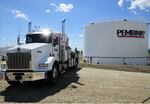
Climate activists protest a propane export terminal proposed for the Port of Portland.
Cassandra Profita
Hundreds of people attended a Portland Planning and Sustainability Commission meeting Tuesday as it considered a zoning decision for a controversial propane export terminal.
The Canadian company Pembina has proposed building a $500 million propane export terminal at the Port of Portland on the Columbia River by 2018.
While the company and its supporters tout the jobs the project will create and the fact that propane burns cleaner than other fuels, opponents argue it's still a dirty business tied to fracking for fossil fuels and harmful greenhouse gas emissions.
The proposed terminal would be capable of handling 1.6 million gallons a day of liquid propane, delivered by train from a Pembina gas processing facility in Alberta. It would be held in refrigerated storage tanks and piped onto export ships bound for Asia. The project would generate up to 800 construction jobs and up to 40 permanent positions.
The pipeline running from the propane storage tanks to the ships would have to cross an environmental overlay zone where gas pipelines are currently prohibited. On Tuesday, Portland planning commissioners weighed a zone amendment that would allow only propane to be piped through the environmental zone.

Pembina Pipeline Corporation plans to invest $500 million in an agreement with the Port of Portland for a propane export facility on the Columbia River.
Pembina Pipeline Corporation
The board heard hours of testimony and did not make a decision. Commissioners said they'd like to know more about safety issues such as how much area would be affected in case of an explosion or fire, how the facility would hold up to earthquakes and floods, and whether emissions associated with the project conflict with the city's Climate Action Plan. Their recommendation will go to the Portland City Council for a final vote.
Propane is a byproduct of processing natural gas and refining petroleum, and it's commonly used to fuel backyard barbecues.
Company Vice President Stu Taylor said the propane his company would be exporting is the same as the propane people use at home, just stored at lower pressure.
"It is the same liquid propane. There's just more of it," he said. "Propane is a safe project. We've been delivering propane to the Portland area for 15 years without incident."
Taylor said industries in Asia want to use the propane for plastics manufacturing because it's a cleaner alternative to other fuels.
"This is a great chance to connect propane in North America with markets in Asia that are looking for a way to get from heavier fuels," he said.
Taylor points to the decision by Portland Public Schools to convert its fleet of buses on to propane as proof that the fuel is both clean and safe.

Hundreds attended a hearing on the Pembina propane export terminal.
Courtesy of Portland Climate Action Coalition
But opponents argue the fugitive emissions from natural gas extraction, as well as the emissions from transporting and burning propane should be counted in the carbon footprint of the export terminal.
Daphne Wysham of the Center for Sustainable Economy said propane exports are part of a larger fossil fuel industry, and she doesn't want Portland to support it.
"We see the propane export terminal as just one in a series of assaults that Oregon is facing from the fossil fuel industry," she said. "We've got oil, gas, coal and now liquid propane coming through our ports."
Part of Pembina's operations involve transporting crude oil from the Alberta tar sands, a large deposit of heavy crude oil mixed with sand and clay. However, the company says the propane would not come from the tar sands.
Bob Sallinger of the Audubon Society of Portland told commissioners the project doesn't fit with the city's Climate Action Plan, which aims to reduce contributions to climate change.
"We want to remain a national leader in reducing greenhouse gases and refuse to become a part of the fossil fuel pipeline to Asia," he said. "We need to be keeping fossil fuels in the ground."
The company today announced commitments to using union labor and purchasing renewable energy to fuel the facility.
The Portland Planning Commission ail continue to take public comments on the project through March 17.
